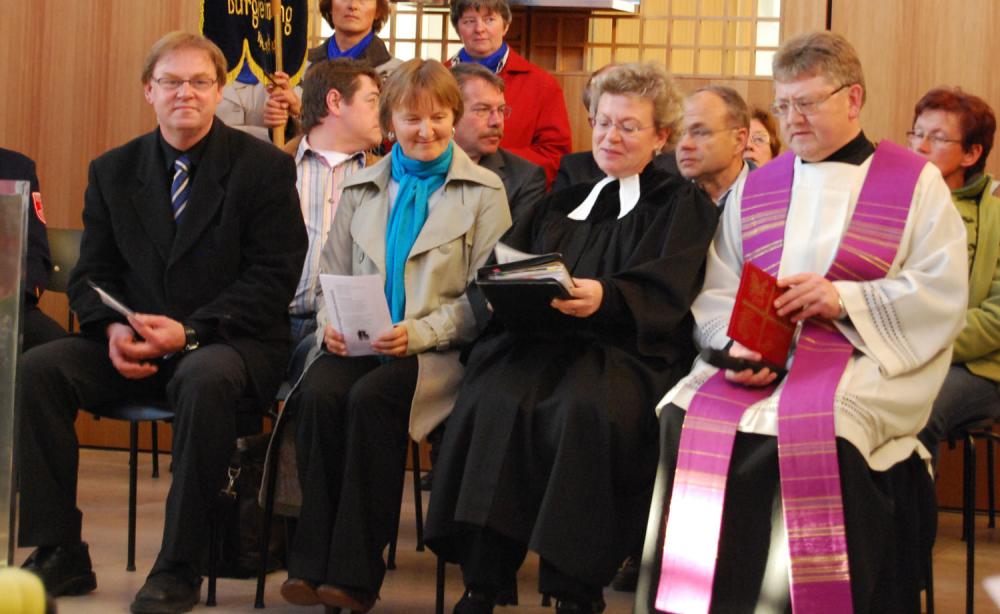Celebrating the Week of Prayer for Christian Unity in Germany
Over the more than 10 years I have been serving as pastor in Evangelische Freikirche Mennonitengemeinde Regensburg, the Burgweinting neighbourhood has been celebrating an ecumenical worship service during the Week of Prayer for Christian Unity.* Participating congregations consist of the Roman Catholic congregation, the Evangelical Lutheran congregation and the Mennonite congregation.
This year, we transformed the church service into a Bible study. After beginning with songs and prayer, we three pastors invited participants to join us in separate rooms for discussion on a different biblical text. This idea came up because we think it is important to create more room for the Bible to be heard and for us to demonstrate its inspiring power.
The worship services are characterized by a unique atmosphere. I experience joy in accomplishing something special together. I also feel anticipation, even a spirit of adventure, as we each allow ourselves to experience elements which are unfamiliar to us.
The fact that we so openly and trustingly incorporate special elements in these worship services is a sign for me of our steadily growing relationship. Over the years, additional activities have been added, such as the worldwide Women’s Day of Prayer, a joint Children’s Bible Week and more.
Each of us pastors can, of course, find something questionable about the other denominations, but we have decided to ignore these divisive topics. Too often, the unity in our confession of Christ and to the Bible as the Word of God is undermined by points of conflict of which we are aware, but we cannot solve.
Instead, we deepen our community as pastors by realizing that there is no perfect church, and that each of our traditions has its own weaknesses and transgressions. Being a part of our own individual church is an experience that we deeply enjoy and have in common. Additionally, we experience how our faith in Christ grows when we curiously ask questions and are eager to learn more from each other. For example, an exciting and never-ending topic is congregational culture. I am amazed at the careful and detailed planning of the church services in the Roman Catholic Church, particularly in the week before Easter, with its many services and symbolic elements. My Catholic pastor colleague is amazed by the many engaged women and men, young and old, who come together in our congregation and share their lives with one another.
My congregation is glad for this path of togetherness with the other denominations. As recently as 50 years ago, members who married someone belonging to another Christian church lost their church membership. Later, mixed-confession couples were respected, but felt like they were treated as second-class members. Today, this problem has been overcome, and
these families experience our ecumenical involvement as refreshing and healing.
A significant factor that binds us together with all Christian confessions is our pain that so few people in our society are willing to open themselves to the treasure of faith and following Jesus. In this sense, we feel that we are all in the same boat together. We share a common desire for God’s kingdom to grow.
Wilhelm Unger is pastor at the Mennonite church in Regensburg-Burgweinting, Germany. Text translated from German by Jolene Wehner.
*Celebrating the Week of Prayer for Christian Unity in Germany
The Week of Prayer is celebrated annually from 18–25 January or from Ascension Day through Pentecost.
This year, a team from Germany (including Ruth Raab-Zerger from Mennonitengemeinden Weierhof) prepared the first draft of the worship material published by the World Council of Churches and the Pontifical Council for Promoting Christian Unity (Vatican).
In a spirit of freedom and adventure, the pastors in Burgweinting plan the service together, each offering ideas and expressions unique to their church culture. This could mean a prayer group typical of Mennonites, or elements from the Catholic and/or Lutheran liturgy. Representatives of the participating denominations, pastors and laypersons, women and men, carry out the individual elements of the liturgy.
